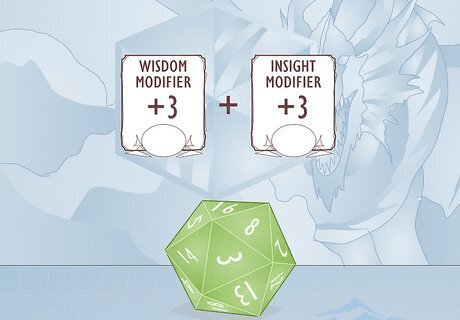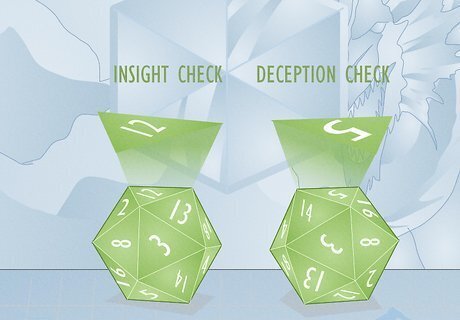
views
- Insight is a skill that determines a character’s ability to read a person’s true intentions. It’s connected to your character’s Wisdom ability score.
- If you’re a player, use Insight checks to tell when a creature is lying, discover why they’re acting a certain way, or get a sense of their desires and motives.
- If you’re a DM, focus on describing creatures’ mannerisms and the sense players get from them. Let players draw their own conclusions based on your description.
What is Insight in D&D 5e?

Insight measures a character’s ability to read someone’s true intentions. In D&D 5e, making an Insight check means your player character (PC) is trying to asses another creature and learn more about them—whether they’re lying, what they’re about to do, or how they’re currently feeling. Insight lets you pick up on body language cues, speech patterns, and noticeable mannerisms. Insight is one of 18 skills every character can use in D&D. Insight is specifically connected to a PC’s Wisdom ability score, with Wisdom being an attribute that measures each PC’s practical intelligence, intuition, and willpower.
When to Use Insight

Find out if a character is lying or hiding something. One of the most common ways to use Insight is to tell when someone tries to lie to your PC. On a successful Insight check, you can often get a sense of whether the potential liar looks nervous or at ease and whether that behavior might be abnormal enough to indicate a lie. For example, say your PC confronts a thief who robbed a noble. They swear the noble is corrupt, and they’re only reclaiming their property—but are they lying? On a successful Insight check, you might discover the thief’s facial cues and body language indicate that they’re telling the truth.

Discover why a character is acting a certain way. Insight is more than just a lie detector; it can also give you information you might not otherwise get about what a character is doing and why they’re doing it. Once you understand why another character is doing something, you might have a better idea of how to handle the situation at hand. For example, if the leader of a town starts acting strangely, your PC could make an Insight check to figure out what’s going on. On a successful check, you might learn that the leader doesn’t seem to be aware of their actions, showing all the signs of being under a charm spell.

Learn about a character’s desires and what appeals to them. Just as Insight can tell you why a character is doing something, it can also tell you what they really want. So, if you’re unsure what your PC should say or do to spin a situation in their favor, you could make an Insight check to see what approach a particular character might respond to. For example, say your PC is trying to get information from a merchant, but the merchant refuses to talk. An Insight check could reveal if the merchant would respond to bribery or intimidation. On a successful check, you might learn that the merchant is greedy and places importance on material wealth, making them highly susceptible to a bribe.

Anticipate a character’s actions. Insight is all about reading creatures and understanding their mannerisms—so, naturally, Insight can give you a sense of what characters might do or say next. Of course, there’s no guarantee that you’ll be able to predict that character’s moves every time (since Insight isn’t the same as mind-reading), but you can still get a solid idea. For example, say your PC is trying to talk a wizard out of setting off a deadly spell. You could make an Insight check to see if the wizard is about to act. On a successful check, you might see the wizard’s eyes move and their body twitch, indicating that they’re about to cast the spell—giving you a moment of time to intervene.
How to Make Insight Checks

Roll a d20 and add your character’s Insight skill modifier. The higher the Insight check, the more successful it is. The lower the check, the less likely you are to succeed and get any reliable insights. Your DM is responsible for setting a DC (difficulty class) for each check, and not every Insight check will have the same DC; some are easier to make, and others are more challenging. Since Insight is connected to Wisdom, your PC’s Insight modifier is the same as their Wisdom modifier. The only exception is if your PC has proficiency in Insight—in which case their Insight modifier is actually their Wisdom modifier + their proficiency bonus. So, if your character’s Wisdom modifier (listed under the ability score on your character sheet) is +3, their Insight modifier is also +3. However, if your character is proficient in Insight and has a proficiency bonus of +2, then their Insight modifier would be +5 (3 + 2).

Make a contested Insight check if the DM calls for it. To tell whether another character is lying, your DM will often ask for a contested roll—your Insight check versus the other character’s Deception check. Simply roll an Insight check for your PC as usual and tell your DM the result; they’re responsible for rolling the Deception check, so they’ll tell you the contest's outcome. If your Insight check exceeds the character’s Deception, you win the contest and gain insight into their behavior. If your Insight check is lower than the character’s Deception, they successfully deceive your PC, and you won’t gain any extra insight.
Is Insight a useful skill?

Insight is incredibly useful but is sometimes misunderstood. Many players think of Insight as nothing but a way to tell whether a character is lying (and get a “yes” or “no” answer from the DM), but it’s more versatile. Insight uncovers lies as well as reveals details about a character’s intentions, motivations, and feelings that you might otherwise miss. In other words, it’s more helpful than many give it credit for! Make a point of asking the DM for Insight checks during interactions! You never know what you might learn from them. Don’t wait until you’re suspicious of a character or think they’re lying. Try making Insight checks when you first meet characters, just to see what their overall demeanor is like or if they might have ulterior motives.
Advice for DMs

Let players draw their own conclusions. It’s easy to tell players that a character is (or isn’t) lying based on the outcome of an Insight check—but that takes away the players’ ability to interpret the information on their own terms. Instead, focus on describing behavior and mannerisms, and the general feeling your player might get from that. Give your players clues, and let them make connections and decide what to do from there. For example, if a player makes a successful Insight check to see if a nobleman is lying (and you know that he is), don’t say, “He’s lying.” Instead, you might say, “He sounds genuine, but there’s sweat on his forehead, and he keeps repeating the same phrase as though it’s been rehearsed.” On the other hand, if they fail the Insight check, don’t say, “He’s telling the truth.” Your players might suspect they’re being lied to since they’ll already know they rolled poorly. Players will likely be suspicious of anything you tell them after rolling a low Insight check—so just say something like, “You don’t gain any additional insights.” That way, your players won’t be able to tell whether the nobleman is lying or not—allowing them to draw their own conclusions once again.

Scale the information players get from Insight based on their rolls. Insight checks don’t have to be outright “fails” or “successes.” Be flexible with them! Try this: the higher your players roll on Insight checks, the more nuanced, detailed information they get from you. That way, even a low check might reveal something a character is doing—but a higher check might also reveal why they’re doing it. For example, say your players are trying to tell whether a mercenary is cheating at cards. If one player rolls a 10 on their Insight check, they might notice that the mercenary seems a little too cocky and pleased with themselves. If another player does even better and rolls an 18 on their Insight check, they might notice that the cocky mercenary glances down to their sleeve every so often…where they can just see the edge of a card poking out.

Incorporate Insight checks into combat scenarios. Want to use Insight more often in your D&D campaign? Let players use it while fighting to spot their opponent’s strengths and weaknesses or potential abilities they might have. Adding Insight to combat might encourage your players to use it more often—and gain a more comprehensive understanding of what it can do. Some DMs have a house rule that allows players to make an Insight check as a bonus action. Consider letting your players do the same! For example, say a player rolls a high Insight check against an enemy. Since they rolled well, you might reveal that the enemy seems wary of any cold-based attacks (implying that they’re vulnerable to cold damage).
Perception vs. Insight

Perception is about awareness, while Insight is about understanding. Many players confuse Perception (which is another Wisdom-based skill) and Insight. The main difference is that Perception determines a PC’s ability to notice details in their environment (like sights, sounds, or smells that others might miss). Insight, conversely, is about understanding the meaning of a creature’s behavior and mannerisms. For example, a Perception check would help you notice a character that appears to be hiding from you. However, an Insight check could reveal whether that character is hiding because they’re afraid of you or because they’re waiting to attack you.



















Comments
0 comment